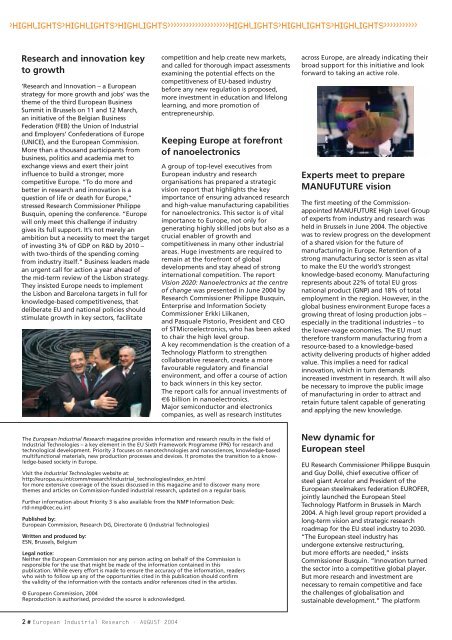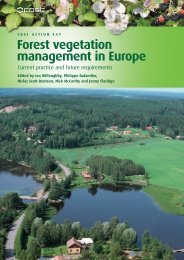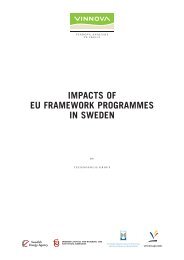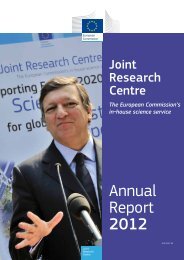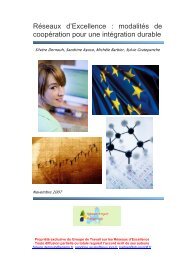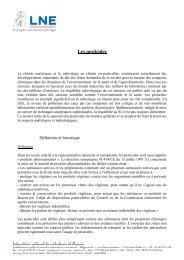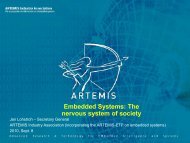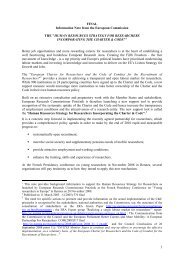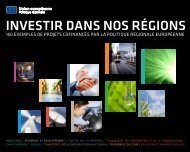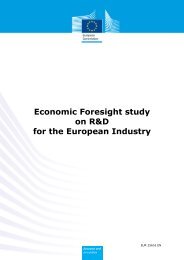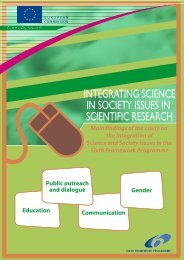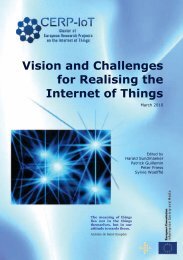August 2004 - European Commission - Europa
August 2004 - European Commission - Europa
August 2004 - European Commission - Europa
You also want an ePaper? Increase the reach of your titles
YUMPU automatically turns print PDFs into web optimized ePapers that Google loves.
›HIGHLIGHTS›HIGHLIGHTS›HIGHLIGHTS››››››››››››››››››››HIGHLIGHTS›HIGHLIGHTS›HIGHLIGHTS›››››››››››<br />
Research and innovation key<br />
to growth<br />
‘Research and Innovation – a <strong>European</strong><br />
strategy for more growth and jobs’ was the<br />
theme of the third <strong>European</strong> Business<br />
Summit in Brussels on 11 and 12 March,<br />
an initiative of the Belgian Business<br />
Federation (FEB) the Union of Industrial<br />
and Employers’ Confederations of Europe<br />
(UNICE), and the <strong>European</strong> <strong>Commission</strong>.<br />
More than a thousand participants from<br />
business, politics and academia met to<br />
exchange views and exert their joint<br />
influence to build a stronger, more<br />
competitive Europe. “To do more and<br />
better in research and innovation is a<br />
question of life or death for Europe,”<br />
stressed Research <strong>Commission</strong>er Philippe<br />
Busquin, opening the conference. “Europe<br />
will only meet this challenge if industry<br />
gives its full support. It’s not merely an<br />
ambition but a necessity to meet the target<br />
of investing 3% of GDP on R&D by 2010 –<br />
with two-thirds of the spending coming<br />
from industry itself.” Business leaders made<br />
an urgent call for action a year ahead of<br />
the mid-term review of the Lisbon strategy.<br />
They insisted Europe needs to implement<br />
the Lisbon and Barcelona targets in full for<br />
knowledge-based competitiveness, that<br />
deliberate EU and national policies should<br />
stimulate growth in key sectors, facilitate<br />
The <strong>European</strong> Industrial Research magazine provides information and research results in the field of<br />
Industrial Technologies – a key element in the EU Sixth Framework Programme (FP6) for research and<br />
technological development. Priority 3 focuses on nanotechnologies and nanosciences, knowledge-based<br />
multifunctional materials, new production processes and devices. It promotes the transition to a knowledge-based<br />
society in Europe.<br />
Visit the Industrial Technologies website at:<br />
http://europa.eu.int/comm/research/industrial_technologies/index_en.html<br />
for more extensive coverage of the issues discussed in this magazine and to discover many more<br />
themes and articles on <strong>Commission</strong>-funded industrial research, updated on a regular basis.<br />
Further information about Priority 3 is also available from the NMP Information Desk:<br />
rtd-nmp@cec.eu.int<br />
Published by:<br />
<strong>European</strong> <strong>Commission</strong>, Research DG, Directorate G (Industrial Technologies)<br />
Written and produced by:<br />
ESN, Brussels, Belgium<br />
Legal notice:<br />
Neither the <strong>European</strong> <strong>Commission</strong> nor any person acting on behalf of the <strong>Commission</strong> is<br />
responsible for the use that might be made of the information contained in this<br />
publication. While every effort is made to ensure the accuracy of the information, readers<br />
who wish to follow up any of the opportunities cited in this publication should confirm<br />
the validity of the information with the contacts and/or references cited in the articles.<br />
© <strong>European</strong> <strong>Commission</strong>, <strong>2004</strong><br />
Reproduction is authorised, provided the source is acknowledged.<br />
2 # <strong>European</strong> Industrial Research - AUGUST <strong>2004</strong><br />
competition and help create new markets,<br />
and called for thorough impact assessments<br />
examining the potential effects on the<br />
competitiveness of EU-based industry<br />
before any new regulation is proposed,<br />
more investment in education and lifelong<br />
learning, and more promotion of<br />
entrepreneurship.<br />
Keeping Europe at forefront<br />
of nanoelectronics<br />
A group of top-level executives from<br />
<strong>European</strong> industry and research<br />
organisations has prepared a strategic<br />
vision report that highlights the key<br />
importance of ensuring advanced research<br />
and high-value manufacturing capabilities<br />
for nanoelectronics. This sector is of vital<br />
importance to Europe, not only for<br />
generating highly skilled jobs but also as a<br />
crucial enabler of growth and<br />
competitiveness in many other industrial<br />
areas. Huge investments are required to<br />
remain at the forefront of global<br />
developments and stay ahead of strong<br />
international competition. The report<br />
Vision 2020: Nanoelectronics at the centre<br />
of change was presented in June <strong>2004</strong> by<br />
Research <strong>Commission</strong>er Philippe Busquin,<br />
Enterprise and Information Society<br />
<strong>Commission</strong>er Erkki Liikanen,<br />
and Pasquale Pistorio, President and CEO<br />
of STMicroelectronics, who has been asked<br />
to chair the high level group.<br />
A key recommendation is the creation of a<br />
Technology Platform to strengthen<br />
collaborative research, create a more<br />
favourable regulatory and financial<br />
environment, and offer a course of action<br />
to back winners in this key sector.<br />
The report calls for annual investments of<br />
€6 billion in nanoelectronics.<br />
Major semiconductor and electronics<br />
companies, as well as research institutes<br />
across Europe, are already indicating their<br />
broad support for this initiative and look<br />
forward to taking an active role.<br />
Experts meet to prepare<br />
MANUFUTURE vision<br />
The first meeting of the <strong>Commission</strong>appointed<br />
MANUFUTURE High Level Group<br />
of experts from industry and research was<br />
held in Brussels in June <strong>2004</strong>. The objective<br />
was to review progress on the development<br />
of a shared vision for the future of<br />
manufacturing in Europe. Retention of a<br />
strong manufacturing sector is seen as vital<br />
to make the EU the world’s strongest<br />
knowledge-based economy. Manufacturing<br />
represents about 22% of total EU gross<br />
national product (GNP) and 18% of total<br />
employment in the region. However, in the<br />
global business environment Europe faces a<br />
growing threat of losing production jobs –<br />
especially in the traditional industries – to<br />
the lower-wage economies. The EU must<br />
therefore transform manufacturing from a<br />
resource-based to a knowledge-based<br />
activity delivering products of higher added<br />
value. This implies a need for radical<br />
innovation, which in turn demands<br />
increased investment in research. It will also<br />
be necessary to improve the public image<br />
of manufacturing in order to attract and<br />
retain future talent capable of generating<br />
and applying the new knowledge.<br />
New dynamic for<br />
<strong>European</strong> steel<br />
EU Research <strong>Commission</strong>er Philippe Busquin<br />
and Guy Dollé, chief executive officer of<br />
steel giant Arcelor and President of the<br />
<strong>European</strong> steelmakers federation EUROFER,<br />
jointly launched the <strong>European</strong> Steel<br />
Technology Platform in Brussels in March<br />
<strong>2004</strong>. A high level group report provided a<br />
long-term vision and strategic research<br />
roadmap for the EU steel industry to 2030.<br />
“The <strong>European</strong> steel industry has<br />
undergone extensive restructuring,<br />
but more efforts are needed,” insists<br />
<strong>Commission</strong>er Busquin. “Innovation turned<br />
the sector into a competitive global player.<br />
But more research and investment are<br />
necessary to remain competitive and face<br />
the challenges of globalisation and<br />
sustainable development.” The platform


